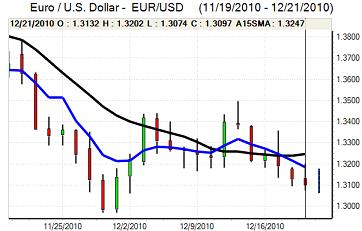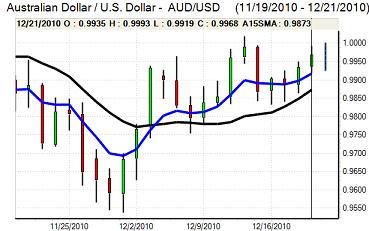EUR/USD
The Euro initially maintained a firm tone in Europe on Tuesday, but was unable to break above resistance in the 1.32 area against the dollar which encouraged some fresh selling pressure on the currency. The pressure intensified following Moody’s announcement that Portugal’s credit rating was being put under review for a fresh downgrade.
There was also speculation that Greece’s ratings would be cut and a growing unease that France’s AAA rating could also be in jeopardy. Markets are expecting that Portugal will require EU support during the first quarter of 2011 and there are also important tensions surrounding the ECB. In this environment, underlying Euro sentiment remained negative and it retreated to fresh 3-month lows below 1.3080 before staging a tentative recovery.
The US Federal Reserve announced that its dollar swaps liquidity programme would be extended until August 2011. Although amounts in the tenders have been low, the extension will fuel market fears that banking-sector tensions are rising again. The dollar will tend to gain ground if European banks find it difficult to secure US funding in the open market.
Liquidity will continue to deteriorate over the remainder of this week which will maintain the potential for erratic trading. The dollar is also still being hampered by a lack of confidence in the medium-term fundamentals with the Euro consolidating above 1.31 in Asia on Wednesday.

Source: VantagePoint Intermarket Analysis Software
Call now and you will be provided with FREE recent forecasts
that are up to 86% accurate * 800-732-5407
If you would rather have the recent forecasts sent to you, please go here
Yen
The dollar was unable to make ground during the European session on Tuesday and retreated to test support near 83.50. There were reports that the Japanese postal savings fund was buying the US currency close to 83.50 and this underpinned the dollar with support holding firm.
The US currency is also gaining some protection on yield grounds, but this has not been enough to trigger a significant move higher in the US currency. The seasonally-adjusted Japanese trade surplus fell to JPY0.43trn for November from JPY0.58trn previously and there will be further concerns over export competitiveness which maintain pressure for yen gains to be resisted, especially with pessimism over the fourth-quarter GDP data.
Year-end factors will be important over the next few sessions with the potential for capital repatriation by Japanese institutions and corporates which will tend to put some upward pressure on the yen and there will also be the risk of volatile trading. The dollar edged higher to the 83.75 area in Asia on Wednesday.
Sterling
Sterling was unable to sustain a move above 1.5550 against the dollar on Tuesday and weakened sharply later in the European session.
The latest monthly government borrowing requirement of GBP22.8bn was sharply higher than expected and was also a record deficit for the month with the cumulative position now little changed from last year. The higher than expected shortfall will increase reservations over the UK structural outlook and will increase the risk of contagion surrounding debt levels.
Underlying confidence in the economy has also weakened with expectations that growth will slow sharply and there have also been fresh concerns over the banking sector. There is liable to be increased speculation that only a small deterioration in the growth and debt dynamics could expose Sterling to heavy selling pressure.
The UK currency dipped to fresh 3-month lows below 1.5450 against the dollar before finding some degree of support with the Euro hitting resistance above 0.85.
Swiss franc
The Euro remained under pressure against the Swiss franc on Tuesday and hit a succession of record lows with a trough near 1.2530. Given persistent franc strength on the crosses, the dollar was unable to make any headway and dipped to test support near 0.9560.
The Swiss currency is continuing to gain important and sustained defensive inflows from the lack of Euro-zone confidence. The latest trade data recorded an export decline of 3.4% for November and, although the underlying trade performance remained robust, there will be increased domestic unease over the impact of further franc strength with increased pressure for National Bank action.

Source: VantagePoint Intermarket Analysis Software
Call now and you will be provided with FREE recent forecasts
that are up to 86% accurate * 800-732-5407
If you would rather have the recent forecasts sent to you, please go here
Australian dollar
The Australian dollar hit resistance close to 0.9990 against the US dollar on Tuesday, but it proved broadly resilient in the face of fresh Euro selling pressure and it held above the 0.9950 level in New York.
Year-end positioning will remain an important near-term factor and there will be institutional interest in holding the currency given the strong gains recorded in 2010. There will also be persistent interest in the currency as a diversification away from the main currencies.



